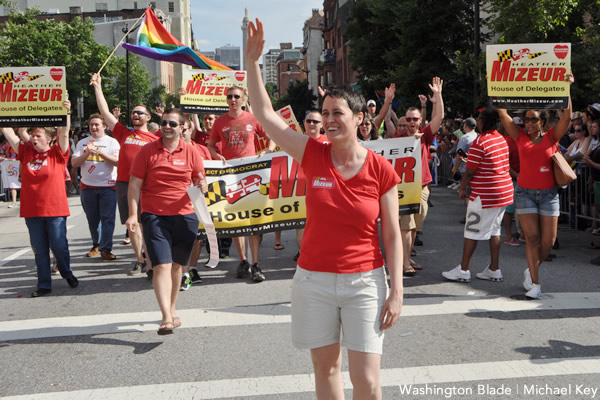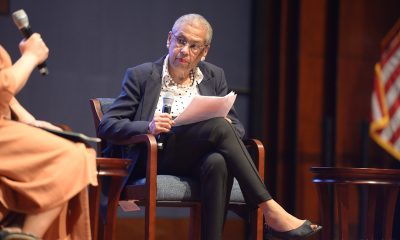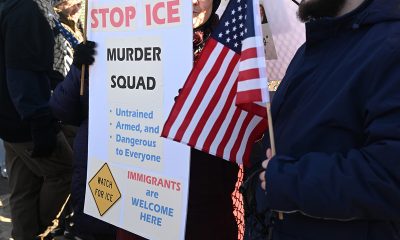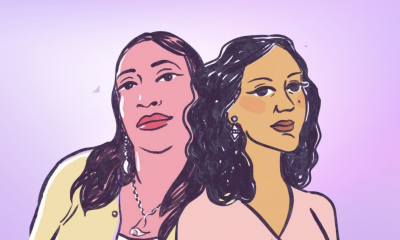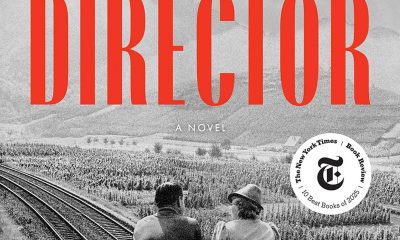Local
It’s official: Mizeur announces run for Md. governor
Democrat would become country’s first openly gay state executive
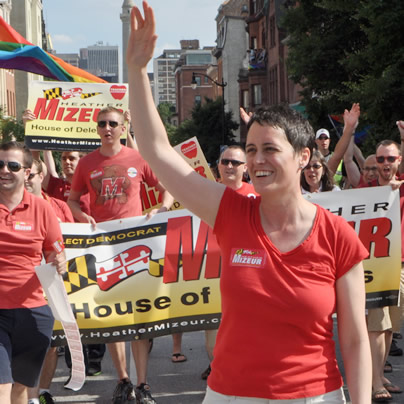
Maryland state Del. Heather Mizeur (D-Montgomery County) has formally announced her 2014 gubernatorial campaign.
“I’m running for governor because I love this state and I see limitless possibilities on what we can accomplish together,” she told the Washington Blade in an interview before she officially declared her candidacy in an e-mail to supporters. Mizeur cited economic development, protecting the state’s environment and improving the quality of Maryland’s public schools and health care system as among her top campaign issues. “There are great challenges facing us and also incredible opportunities.”
Mizeur, 40, has represented the 20th House District that includes Takoma Park and Silver Spring in the General Assembly since 2006.
The former Democratic National Committee member worked on now Secretary of State John Kerry’s 2004 presidential campaign. Mizeur in 2008 endorsed President Obama’s election campaign after her consideration of him or then-New York Sen. Hillary Clinton received national attention.
Mizeur would make history as Maryland’s first female governor and the country’s first openly LGBT governor if voters elect her in 2014.
“Diversity is enormously important,” she told the Blade. “Not simply to have a gay governor, but to have a governor who can represent the voices of people in communities that have not always had a voice in the process.”
Mizeur added her approach to governing the state and her vision for Maryland is “about bringing people together and making everyone a stakeholder and creating solutions to the issues” it faces.
Brown, Gansler have fundraising advantage
Mizeur will face off against Lieutenant Gov. Anthony Brown, who last month unveiled Howard County Executive Ken Ulman as his running mate. Attorney General Doug Gansler is expected to officially declare his candidacy to succeed Gov. Martin O’Malley in 2014 later this year, while Congressman Dutch Ruppersberger is also considered a potential candidate.
Harford County Executive David Craig, state Del. Ron George (R-Anne Arundel County,) 2012 U.S. Senate candidate Brian Vaeth and Frederick County Board of Commissioners President Blaine Young have also officially declared their candidacy on the Republican side.
Craig on Tuesday unveiled state Del. Jeannie Haddaway-Riccio (R-Talbot County) as his running mate.
Former Republican National Committee Chair Michael Steele, who was Maryland’s lieutenant governor from 2003-2007, said last month during an interview with MSNBC’s Chuck Todd he is “looking at” entering the race. Former 2010 congressional candidate Charles Lollar is among the other Republicans who are rumored to be considering their own gubernatorial bids.
EMILY’s List and the Gay and Lesbian Victory Fund are expected to back Mizeur’s campaign, but campaign finance reports indicate both Brown and Gansler have a significant fundraising advantage.
Mizeur reported in a campaign finance report she filed in January that she raised $244,089.40 between Jan. 12, 2012, and January 9 of this year. Brown said he raised $1,247,811.80 in cash and in-kind donations during the same period, while Gansler netted $1,236,284.96.
Mizeur declined to disclose to the Blade the amount of money she has raised since the last campaign finance report she filed in January.
She again stressed she feels she is the best person to succeed O’Malley in Annapolis in 2014.
“I’m not going to go into office playing it safe for four years so that I can assure myself of re-election,” Mizeur said. “The bold, aggressive, visionary ideas that I’m laying out in the course of the campaign is the action agenda for my term as governor.”
Mizeur defends role she played to advance marriage bill
Rev. Delman Coates of Mt. Ennon Baptist Church in Prince George’s County and other LGBT rights advocates have applauded Mizeur for the role she played in the passage of Maryland’s same-sex marriage referendum last November in spite of Marylanders for Marriage Equality Campaign Manager Josh Levin’s suggestion that she could have done more to support the effort.
Mizeur pointed out to the Blade during an exclusive interview last fall during which she announced she was considering a run for governor that she took part in fundraising events and testified in support of the bill. The Montgomery County Democrat, who married her wife, Deborah Mizeur, during a 2005 ceremony along the Chesapeake Bay and again in California before voters in 2008 approved Proposition 8 that banned gay nuptials in the state, also gave an emotional speech on the floor of the House of Delegates before it passed the same-sex marriage bill in 2012.
Mizeur also noted she and the other seven openly gay Maryland lawmakers remained focused on the same-sex marriage effort throughout the 2012 legislative session.
“Each of us was working hard in our own way,” Mizeur told the Blade last fall. “My entire public schedule was Question 6-related for months.”
Mizeur said she also worked “very closely” with Gender Rights Maryland Executive Director Dana Beyer earlier this year to advance a bill that would have banned anti-transgender discrimination in housing, employment and public accommodation.
The Senate Judicial Proceedings Committee in March narrowly struck down the measure.
Mizeur pointed to both the same-sex marriage and trans rights bills as examples of her “ability to work with my colleagues” to “push through some pretty big efforts.”
“I will continue to build on those relationships in order to get other priority issues pushed through the General Assembly,” she said
Beyer, who supports Mizeur, on Tuesday described the Montgomery County Democrat as “a force to be reckoned with.”
“History can be made,” Beyer told the Blade. “Identity politics aside, Heather does her job really well.”
While not explicitly endorsing Mizeur’s campaign, Equality Maryland PAC Chair Tim Williams welcomed her candidacy and other out Marylanders who have decided to seek office in 2014.
“The presence of at least one openly gay candidate in the governor’s race, as well as the many LGBT individuals and allies who are running for other state and local offices, is an indication of how far we have come as a state and a nation,” Williams said in a statement to the Blade.
Maryland
Expanded PrEP access among FreeState Justice’s 2026 legislative priorities
Maryland General Assembly opened on Jan. 14
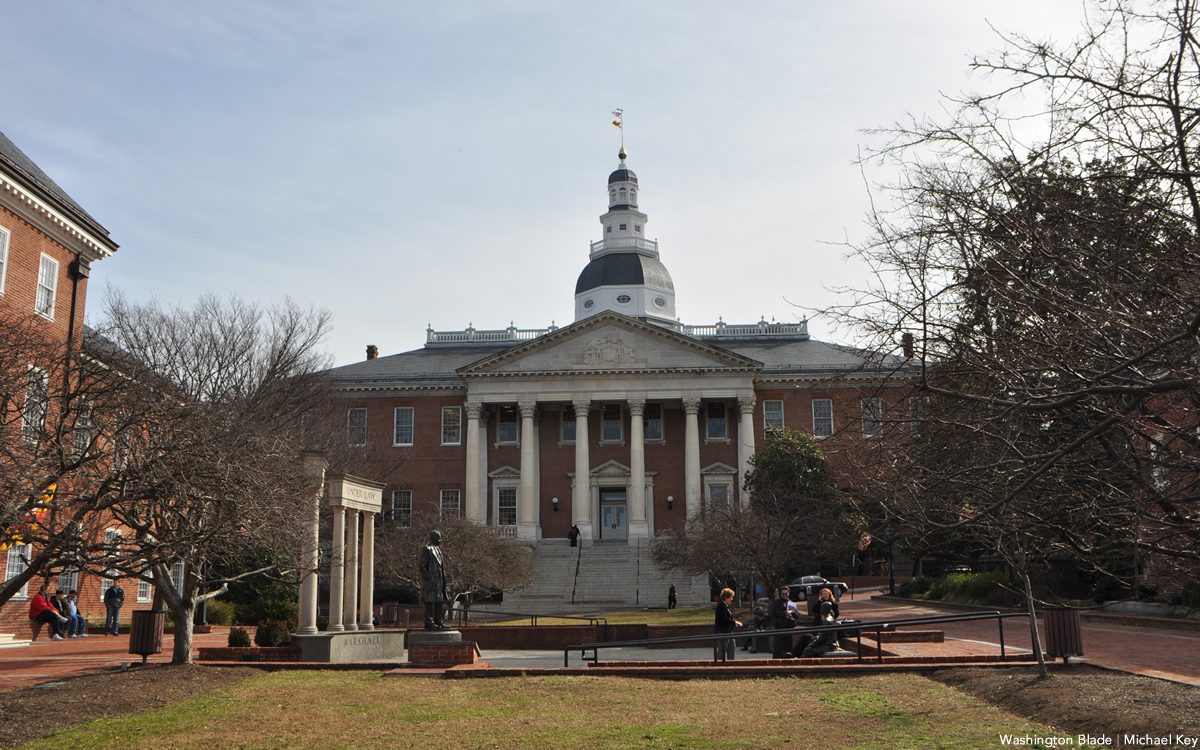
FreeState Justice this week spoke with the Washington Blade about their priorities during this year’s legislative session in Annapolis that began on Jan. 14.
Ronnie L. Taylor, the group’s community director, on Wednesday said the organization continues to fight against discrimination against people with HIV/AIDS. FreeState Justice is specifically championing a bill in the General Assembly that would expand access to PrEP in Maryland.
Taylor said FreeState Justice is working with state Del. Ashanti Martinez (D-Prince George’s County) and state Sen. Clarence Lam (D-Arundel and Howard Counties) on a bill that would expand the “scope of practice for pharmacists in Maryland to distribute PrEP.” The measure does not have a title or a number, but FreeState Justice expects it will have both in the coming weeks.
FreeState Justice has long been involved in the fight to end the criminalization of HIV in the state.
Governor Wes Moore last year signed House Bill 39, which decriminalized HIV in Maryland.
The bill — the Carlton R. Smith Jr. HIV Modernization Act — is named after Carlton Smith, a long-time LGBTQ activist known as the “mayor” of Baltimore’s Mount Vernon neighborhood who died in 2024. FreeState Justice said Marylanders prosecuted under Maryland Health-General Code § 18-601.1 have already seen their convictions expunged.
Taylor said FreeState Justice will continue to “oppose anti anti-LGBTQ legislation” in the General Assembly. Their website later this week will publish a bill tracker.
The General Assembly’s legislative session is expected to end on April 13.
Virginia
From the Pentagon to politics, Bree Fram fighting for LGBTQ rights
Transgender veteran running for Congress in Va.
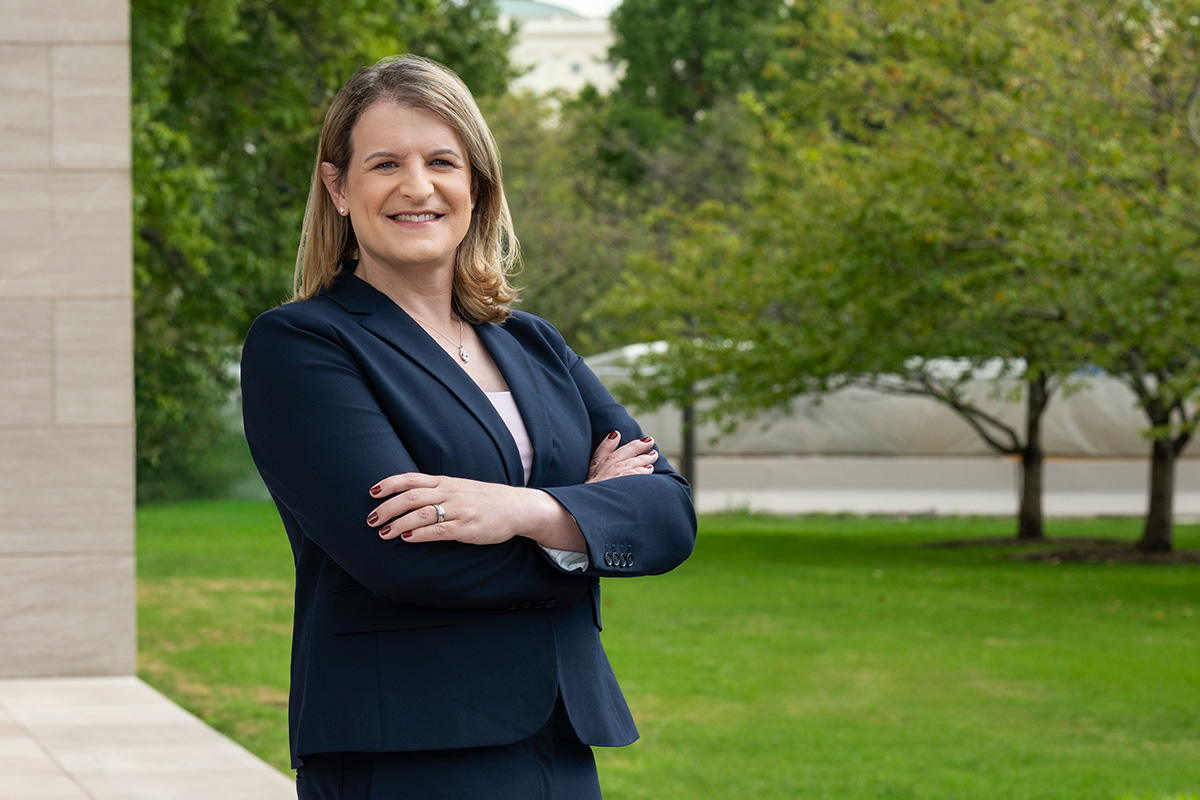
After being ousted from military service, Col. Bree Fram — once the highest-ranking openly transgender officer in the Pentagon — is now running for Congress.
Fram, who lives in Reston, Va., brings more than two decades of public service to her campaign. From the battlefield to the halls of the Pentagon, she spent more than 20 years working inside the federal government, often advocating for LGBTQ people and other marginalized communities from within the system.
Fram spoke with the Washington Blade about her decision to run amid sustained attacks against her — and against the LGBTQ community more broadly — from the Trump-Vance administration and far-right officials.
She said her commitment to public service began more than 22 years ago, shaped in large part by watching the Sept. 11, 2001, terrorist attacks.
“I had grown up expecting that there was this beautiful American peace stretching into the world for the foreseeable future, and that kind of image was shattered,” Fram told the Blade. “I realized that there was a continuous price to be paid to protect our democracy, to protect our freedoms. To be able to play a small part in defending those freedoms was incredibly important to me — to be part of something larger than myself.”
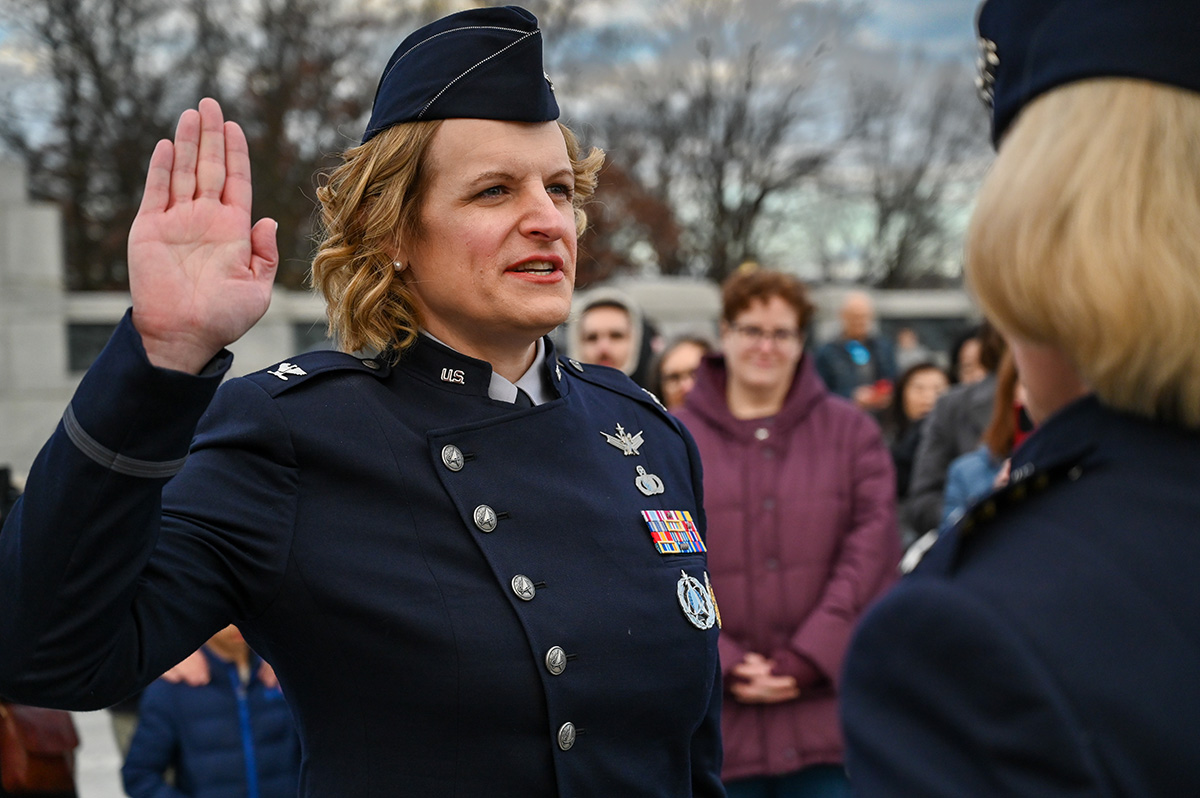
Commissioned through the U.S. Air Force Officer Training School in 2003, Fram served as an astronautical engineer and rose to the rank of colonel in the U.S. Air Force before later serving in the U.S. Space Force. She remained on active duty until 2025, when she was forced out following the Trump-Vance administration’s reinstated ban on trans military service.
Fram has been married for 20 years to her spouse, Peg Fram, and they have two children.
Beyond her military service, Fram has long been involved in advocacy and leadership. She has been a member of SPARTA, a trans military advocacy organization, since 2014, served on its board of directors beginning in 2018, and was president of the organization from 2021-2023.
Most recently, Fram served as chief of the Requirements Integration Division at Headquarters, Space Force, and as co-lead of the Joint Space Requirements Integration Cell in collaboration with the Joint Staff. Previously, she was chief of the Acquisition Policies and Processes Division for the assistant secretary of the Air Force for space acquisition and integration.
Earlier in her career, Fram served as a materiel leader at the Air Force Research Laboratory, overseeing the development of counter-small unmanned aerial systems and offensive cyberspace technologies in support of Pentagon and intelligence community priorities, managing an annual budget exceeding $100 million.
Her previous assignments also included oversight of Air Force security cooperation in four strategically significant Middle Eastern countries and 258 foreign military sales cases valued at $15.79 billion; serving as executive officer to the Air Force director of strategic plans, where she helped integrate the 30-year, $3.6 trillion Air Force Plan; a legislative fellowship on Capitol Hill with then-U.S. Del. Madeleine Bordallo (D-Guam), handling military, veterans, and foreign affairs issues; and a program management role at the National Reconnaissance Office, where she led a $700 million multi-agency engineering and IT contract overseeing more than 500 personnel and supporting $40 billion in assets.
Fram also directed 24/7 worldwide operations and maintenance of mission data processing for space-based and airborne national intelligence assets and co-led the Department of the Air Force’s LGBTQ+ Initiatives Team and Barrier Analysis Working Group from 2023-2025.
She holds a master’s degree from the Air Force Institute of Technology and is a distinguished graduate of the Naval War College. Fram deployed in support of Operation Iraqi Freedom, where she worked on airborne counter-improvised explosive device technologies.
In January, Fram, alongside four other trans military officers, was given a special retirement ceremony by the Human Rights Campaign — a direct result of President Donald Trump’s 2025 Executive Order 14183, titled “Prioritizing Military Excellence and Readiness.” The policy directed the Pentagon to adopt measures prohibiting trans, nonbinary, and gender-nonconforming people from serving in the military.
Under Virginia’s current congressional maps, Fram would challenge Congressman James Walkinshaw in a Democratic primary in the 11th Congressional District, which includes the city of Fairfax and most of Fairfax County. However, the district’s boundaries could change pending ongoing redistricting discussions in the state.
Fram emphasized that her decades working within the executive branch shaped her understanding of what it means to take — and uphold — an oath to the Constitution, even when those in power later forced her out of service solely because of her identity, not her performance.
“Through 23 years of service, I learned what it meant to fulfill that oath to the Constitution, and I wanted to continue serving,” she said. “But when this administration came in and labeled me and others like me ‘dishonorable’ and ‘disciplined liars who lack the humility required for military service,’ it hit hard. When the Supreme Court then agreed to let the administration fire all of us, I had to figure out what would allow me to continue my service in a way that was meaningful and lived up to that oath.”
After being told she would have to retire from a career she describes as her life’s calling, Fram said she began searching for another way to serve — a path that ultimately led her to run for Congress.
“I had done the work over the past couple of decades to understand the America that I believe in, that America I believe we all can be,” Fram said. “That’s where this decision came from. I believe I can fight back and fight forward for Virginians — with the knowledge I have and with a vision of the America we can be.”
That vision, she said, is one that has yet to be fully realized — despite decades of promises from Democratic leaders across all branches of government.
“This is about protecting our fundamental rights — freedom of speech, freedom to assemble, bodily autonomy, a woman’s right to choose, and the ability for queer people to live our best lives,” Fram said. “Right now, our government is throwing barriers up in front of many people. They’re strengthening them, building walls higher, and actively damaging lives.”
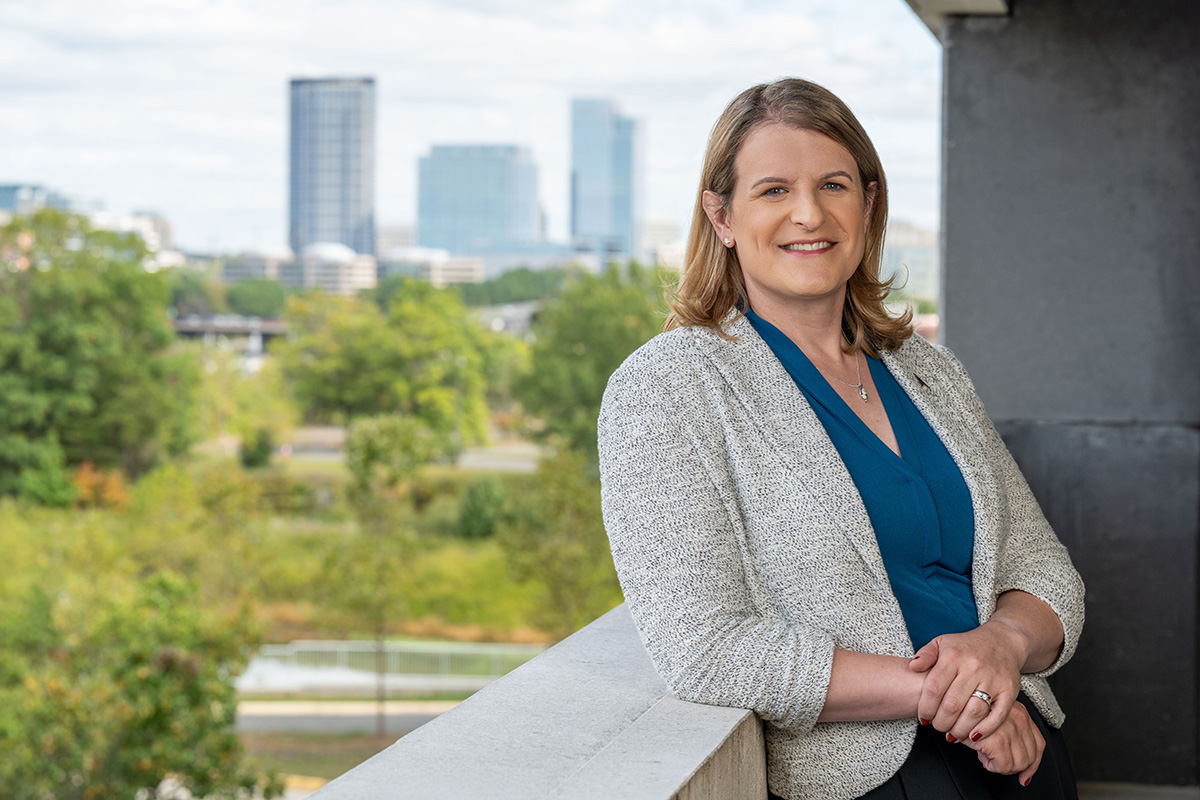
Fram said her leadership philosophy was shaped by watching strong, effective leaders during her time in the Air Force and Space Force — leaders who reinforced her belief that true leadership means expanding opportunity, not restricting it.
“Leadership is about tearing barriers down — not climbing over them and forcing others to suffer through the same things,” she said. “It’s about making sure the people coming up behind us have even more opportunity to go further, faster. How do we be better tomorrow than we are today? How do we fulfill our founding promise of life, liberty, and the pursuit of happiness?”
One way Fram said Congress could help dismantle those barriers is by passing the Equal Rights Amendment, enshrining constitutional protections for all people — particularly LGBTQ Americans.
“Getting the Equal Rights Amendment into the Constitution is absolutely critical to the future of queer rights,” she said. “Voting rights must also be clearly protected.”
Protecting democracy itself is also among her top priorities, Fram said.
“We need to take control of the House so we can put real checks on this administration,” she said. “That allows the American people to see how this administration is actively making their lives worse and less affordable — and it’s how we ultimately throw them out and get back to making life better.”
Fram said her experience working under four presidents — including during Trump’s first term — reinforced her belief that opposition to efforts curtailing civil liberties is essential.
“The primary thing we can do to protect democracy is to get rid of this administration,” she said. “Taking control of the House gives us true investigative power. Under every rock, there is likely an impeachable offense because they are failing to faithfully execute the laws of the United States.”
For her, the message Trump is sending is clear — he and others close-minded to the LGBTQ community are threatened by the possibility of what someone truly dedicated to service can become.
“One of the reasons this administration had to throw us out and silence us was because we were an example of what was possible. We shined so brightly by meeting or exceeding every standard that they couldn’t hide us away by any other means except kicking us out.”
Fram acknowledged that her identity has been a political target since 2016, but said those attacks have never been grounded in her ability to lead or accomplish complex missions over more than two decades of service.
“If others want to attack me on my identity, I welcome it,” she said. “I’m focused on whether people can afford groceries or feel safe in their communities.”
“I’m happy to be a lightning rod for those kinds of attacks,” she added. “If it allows Democrats to advance an agenda that makes life better for Americans, they can come after me all day long. They attacked me while I was in the military, before I was ever running for office.”
On policy, Fram said affordability, health care, and safety are at the center of her agenda.
“No one should be afraid to go to the doctor or fear surprise medical bills that put them into debt,” she said. “Every American deserves access to affordable, high-quality health care.”
She also emphasized a willingness to work across party lines — even with those who previously politicized her identity — if it means delivering results for constituents.
“If someone wants to work together to make people’s lives better, I’ll work with them,” she said. “If they want to come after me based on who I am, they can waste their energy on that.”
Asked how she defines hope in the current political moment, Fram rejected the idea of passive optimism.
“Hope isn’t naive optimism,” she said. “Hope is doing the work — engaging people and bending the moral arc of the universe toward justice.”
She added that representation itself can be transformative.
“Just being in Congress changes the narrative,” Fram said. “It lets a kid say, ‘Oh my God — I could do that too.’”
District of Columbia
Eleanor Holmes Norton ends 2026 reelection campaign
Longtime LGBTQ rights supporter introduced, backed LGBTQ-supportive legislation
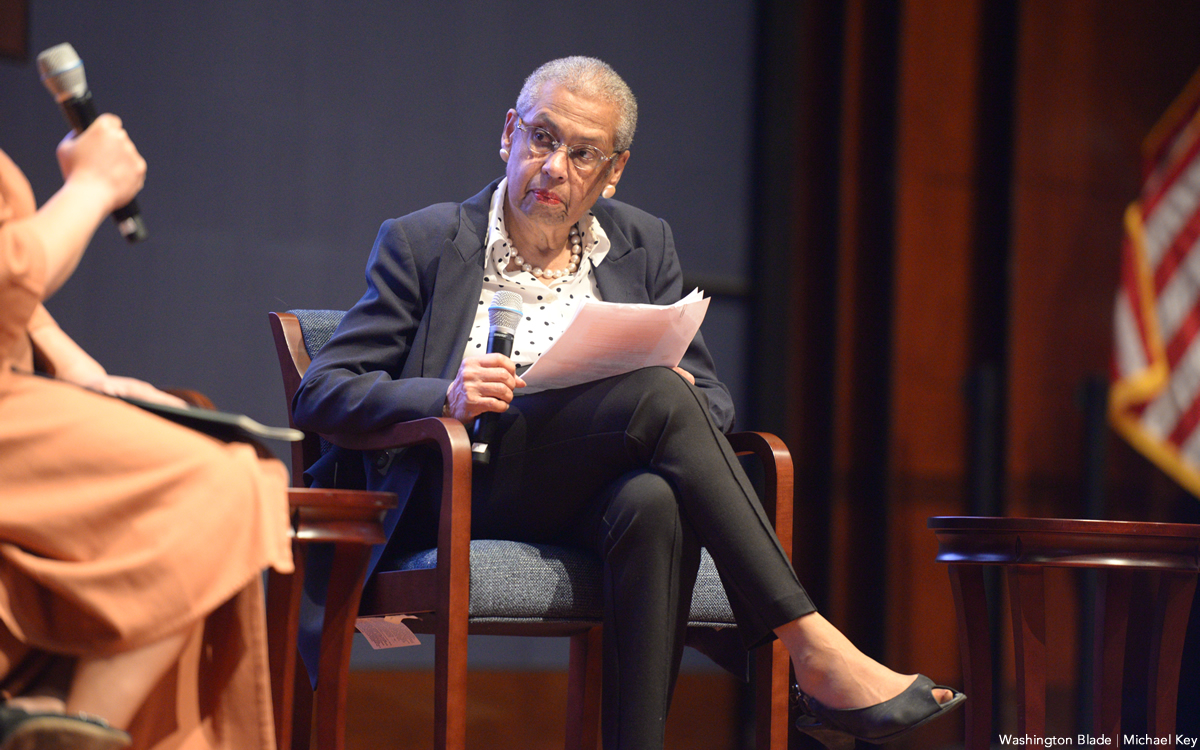
The reelection campaign for D.C. Congressional Delegate Eleanor Holmes Norton, who has been an outspoken supporter of LGBTQ rights since first taking office in 1991, filed a termination report on Jan. 25 with the Federal Elections Commission, indicating she will not run for a 19th term in the U.S. House of Representatives.
Norton’s decision not to run again, which was first reported by the online news publication NOTUS, comes at a time when many of her longtime supporters questioned her ability to continue in office at the age of 88.
NOTUS cited local political observers who pointed out that Norton has in the past year or two curtailed public appearances and, according to critics, has not taken sufficient action to oppose efforts by the Trump-Vance administration and Republican members of Congress to curtail D.C.’s limited home rule government.
Those same critics, however, have praised Norton for her 35-year tenure as the city’s non-voting delegate in the House and as a champion for a wide range of issues of interest to D.C. LGBTQ rights advocates have also praised her longstanding support for LGBTQ rights issues both locally and nationally.
D.C. gay Democratic Party activist Cartwright Moore, who has worked on Norton’s congressional staff from the time she first took office in 1991 until his retirement in 2021, points out that Norton’s role as a staunch LGBTQ ally dates back to the 1970s when she served as head of the New York City Commission on Human Rights.
“The congresswoman is a great person,” Moore told the Washington Blade in recounting his 30 years working on her staff, most recently as senior case worker dealing with local constituent issues.
Norton has been among the lead co-sponsors and outspoken supporters of LGBTQ rights legislation introduced in Congress since first taking office, including the currently pending Equality Act, which would ban employment discrimination based on sexual orientation and gender identity.
She has introduced multiple LGBTQ supportive bills, including her most recent bill introduced in June 2025, the District of Columbia Local Juror Non-Discrimination Act, which would ban D.C. residents from being disqualified from jury service in D.C. Superior Court based on their sexual orientation or gender identity.
For many years, Norton has marched in the city’s annual Pride parade.
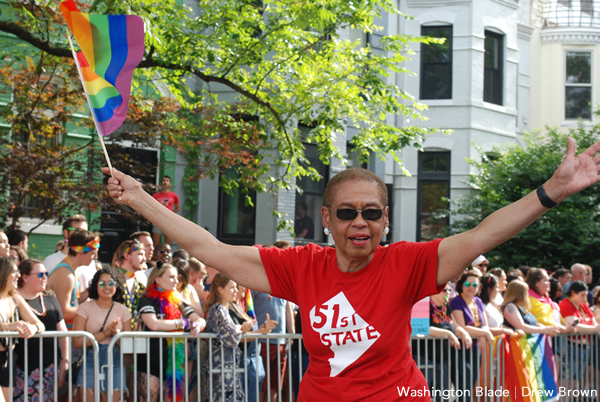
Her decision not to run for another term in office also comes at a time when, for the first time in many years, several prominent candidates emerged to run against her in the June 2026 D.C. Democratic primary. Among them are D.C. Council members Robert White (D-At-Large) and Brooke Pinto (D-Ward 2).
Others who have announced their candidacy for Norton’s seat include Jacque Patterson, president of the D.C. State Board of Education; Kinney Zalesne, a local Democratic party activist; and Trent Holbrook, who until recently served as Norton’s senior legislative counsel.
“For more than three decades, Congresswoman Norton has been Washington, D.C.’s steadfast warrior on Capitol Hill, a relentless advocate for our city’s right to self-determination, full democracy, and statehood,” said Oye Owolewa, the city’s elected U.S. shadow representative in a statement. “At every pivotal moment, she has stood firm on behalf of D.C. residents, never wavering in her pursuit of justice, equity, and meaningful representation for a city too often denied its rightful voice,” he said.
A spokesperson for Norton’s soon-to-close re-election campaign couldn’t immediately be reached for a comment by Norton on her decision not to seek another term in office.
-

 District of Columbia5 days ago
District of Columbia5 days agoEleanor Holmes Norton ends 2026 reelection campaign
-

 Opinions4 days ago
Opinions4 days agoICE agents murder another American citizen in Minneapolis
-

 Honduras5 days ago
Honduras5 days agoCorte IDH reconoce a Thalía Rodríguez como familia social de Leonela Zelaya
-

 Books4 days ago
Books4 days ago‘The Director’ highlights film director who collaborated with Hitler

